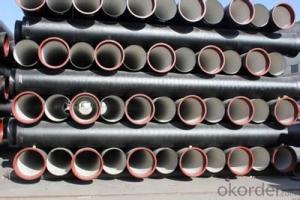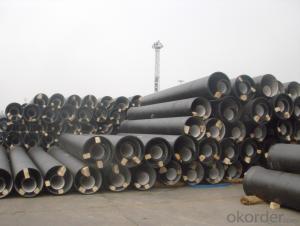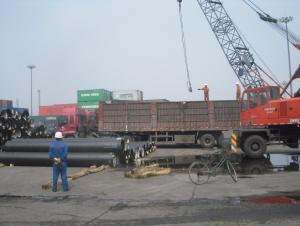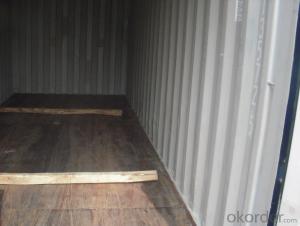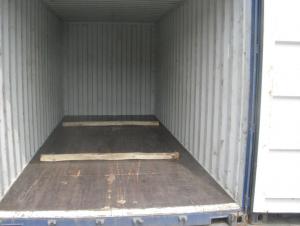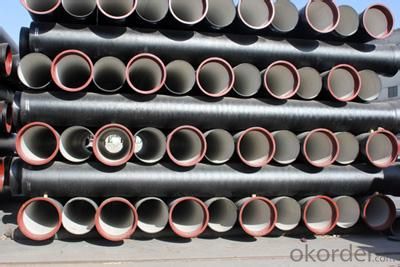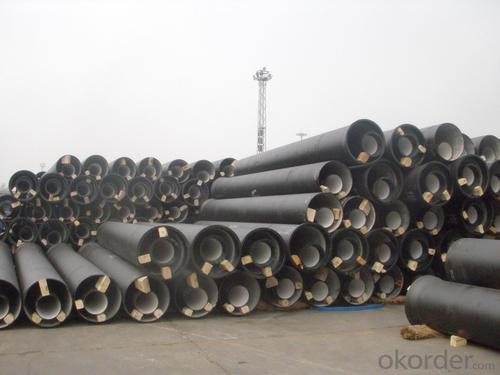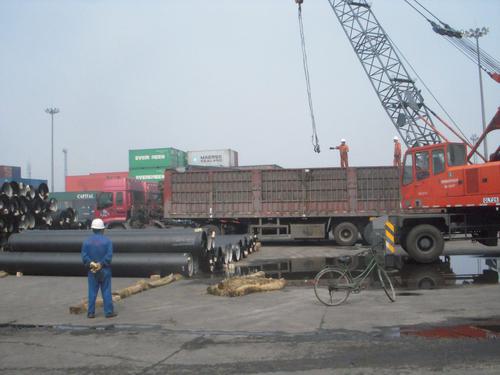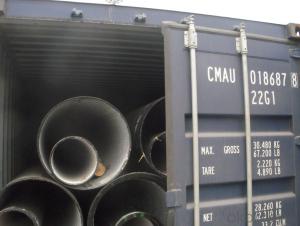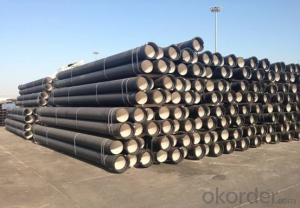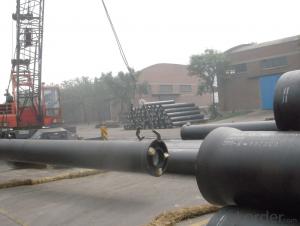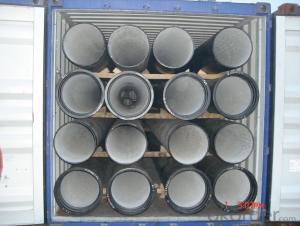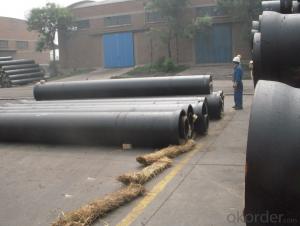DUCTILE IRON PIPES K8 DN900
- Loading Port:
- China Main Port
- Payment Terms:
- TT OR LC
- Min Order Qty:
- -
- Supply Capability:
- -
OKorder Service Pledge
OKorder Financial Service
You Might Also Like
Ductile Iron Cast Pipe is without any defects compare with tradition casting tech, which has many advantages particularly as follow:
(1) High density. In the "vertical upward casting" process, the melt iron of centre liquid column in center crystallizer is continuously feeding for volume shrinkage caused by condensation tube at outer circumference , which lead to be free of shrinkage porosity.
(2) High purity. When melt iron pouring, the mixed impurities such as gas, dross, sand grain which are lighter than melt iron could be eliminated at furnace mouth, its impossible to enter into the crystallizer through the channel, so the melt iron into the crystallizer is very pure.
(3) Strength with toughness. The cooling speed provided by continuous crystallizer is 30 times than sand casting and 5 times than centrifugal casting, and doesn't produce white iron, the eutectic cell volume of continuous cast iron is one eighth to one tenth compare with traditional cast iron. The density of graphite nodule in ductile iron can reach 300-700 pcs/mm2. Therefore, all reason above improve the strength and toughness of continuous cast iron.
(4) Free machining. The high speed cooling make the hardening phase (such as boride, steadite) not appear like reticular, massive or thick, but diffuse like fish bone and pane in shape, moreover, there are tiny graphite flakes inlaid hardening phase. It's free machining in BrinellHardness the range of 250-300HB. However, the Brinell Hardness of 250 is top limit to common metal materials.
(5) Uniform composition of tube wall. The convection mixing of liquid column caused by marching type drawing in crystallizer make the composition of tube wall well-distributed, and concentration gradient very little.
(6) High productivity. To the wall thickness of tube under 10mm, the speed of continuous casting is 1 meter/min, to the wall thickness of tube under 20mm, the speed of continuous casting is 0.5 meter/min, which is high efficiency that centrifugal or other casting tech couldn't reach.
- Q: Are ductile iron pipes suitable for use in paper mills?
- Yes, ductile iron pipes are suitable for use in paper mills. Ductile iron pipes are known for their strength, durability, and corrosion resistance, making them ideal for handling various fluids, including those used in paper mills. Additionally, their ability to withstand high pressures and temperatures makes them reliable and long-lasting in the demanding operating conditions of a paper mill.
- Q: Can ductile iron pipe be used for sewer and wastewater systems?
- Yes, ductile iron pipe can be used for sewer and wastewater systems. Ductile iron is a type of cast iron that has improved properties such as increased durability, strength, and flexibility. These qualities make it suitable for underground applications, including sewer and wastewater systems. Ductile iron pipes are resistant to corrosion and can withstand high-pressure conditions, making them ideal for conveying sewage and wastewater. Additionally, ductile iron pipes have a long service life and require minimal maintenance, which makes them a cost-effective choice for sewer and wastewater infrastructure.
- Q: How are ductile iron pipes protected against external corrosion?
- Ductile iron pipes are protected against external corrosion through a combination of manufacturing processes and external coatings. The first line of defense is the inherent corrosion resistance of ductile iron itself. The iron is treated with a special alloying element, typically magnesium, which forms a protective layer on the surface of the pipe. This layer acts as a barrier against corrosion and helps to extend the lifespan of the pipe. In addition to the corrosion-resistant properties of the iron, ductile iron pipes are also externally coated with protective materials. One common method is to apply a layer of asphaltic or bituminous coating to the pipe's surface. This coating acts as a barrier against moisture and corrosive substances in the soil, preventing them from coming into contact with the iron. It also provides a layer of insulation, reducing the likelihood of galvanic corrosion. Another method of external corrosion protection is the use of fusion-bonded epoxy (FBE) coatings. FBE is a thermosetting resin that is applied to the surface of the pipe and then heat-cured to form a strong and durable coating. This coating provides excellent resistance against corrosion, abrasion, and impact, making it a popular choice for ductile iron pipes in harsh environments. In some cases, additional protective measures such as cathodic protection systems may be employed. These systems use electric currents to counteract the corrosion process by supplying electrons to the pipe's surface. This helps to prevent corrosion from occurring, especially in areas where the coating may have been damaged or compromised. Regular maintenance and inspection are also crucial in ensuring the long-term protection of ductile iron pipes against external corrosion. This includes periodic cleaning, repair of any coating damages, and monitoring the integrity of the protective layers. Overall, the combination of the inherent corrosion resistance of ductile iron, external coatings, and maintenance practices ensures that ductile iron pipes are well-protected against external corrosion, allowing them to have a longer lifespan and deliver reliable performance in various applications.
- Q: How do ductile iron pipes perform in cold weather conditions?
- The exceptional performance of ductile iron pipes in cold weather conditions is well-known. Unlike cast iron or PVC, ductile iron exhibits remarkable resistance to low temperatures. This resistance is primarily attributed to its unique microstructure, which enables it to maintain its structural integrity even in extreme weather conditions. In freezing temperatures, ductile iron pipes demonstrate a low coefficient of thermal expansion, meaning they do not contract or expand significantly with changes in temperature. This characteristic ensures their stability and prevents cracking or bursting. Additionally, the high impact resistance of ductile iron further enhances its ability to withstand the stress imposed by cold weather conditions. Moreover, ductile iron pipes are equipped with a protective lining, typically composed of cement mortar or epoxy. This lining acts as an additional barrier against the effects of cold weather, preventing the formation of ice on the inner surface of the pipes. Consequently, the risk of blockages or reduced flow capacity is greatly reduced. In conclusion, ductile iron pipes are a reliable choice for cold weather conditions. Their durability, low thermal expansion, and protective lining make them highly resistant to the challenges posed by freezing temperatures. Whether used for water supply, sewer systems, or other applications, ductile iron pipes have consistently proven their effectiveness even in the harshest winter climates.
- Q: Are ductile iron pipes suitable for trenchless installation methods?
- Trenchless installation methods can indeed utilize ductile iron pipes effectively. Renowned for their strength, durability, and flexibility, ductile iron pipes prove to be an excellent choice for techniques like horizontal directional drilling (HDD) and pipe bursting. When employing HDD, a small pilot hole is drilled underground, and the ductile iron pipe is subsequently pulled through this hole, eliminating the need for extensive trenching. The robustness of ductile iron pipes allows them to endure the pulling forces exerted during this process while being effortlessly guided along the underground path. Pipe bursting, on the other hand, is another trenchless method that involves breaking apart an existing pipe while simultaneously pulling a new ductile iron pipe into place. Due to their strength and flexibility, ductile iron pipes can withstand the force required to burst the current pipe, resulting in minimal disruption to the surrounding area. Both these trenchless installation methods offer various advantages when ductile iron pipes are used. These pipes possess a high resistance to corrosion and can endure high-pressure applications, making them suitable for a broad range of underground environments. Moreover, their long service life reduces the need for frequent replacement and maintenance. Ultimately, ductile iron pipes emerge as a dependable and appropriate option for trenchless installation methods, presenting efficient and cost-effective solutions for underground pipe installations.
- Q: Are ductile iron pipes suitable for use in power plants?
- Yes, ductile iron pipes are suitable for use in power plants. They possess excellent mechanical properties, such as high strength, durability, and impact resistance, making them suitable for transporting water, steam, and various chemicals in power plant applications. Additionally, their corrosion resistance and ability to withstand high temperatures make them a reliable choice for conveying fluids in power generation facilities.
- Q: What are the different types of joints used in ductile iron pipes?
- Ductile iron pipes commonly utilize various types of joints to achieve secure and leak-proof connections between pipe sections. Here are some of the frequently employed joint types: 1. Push-on joint: This joint type offers easy installation without the need for specialized tools. It entails lubricating the gasket on one pipe end and inserting it into the socket of the adjacent pipe. The gasket ensures a tight seal to prevent any leakage. 2. Mechanical joint: Consisting of a gland and a follower gasket, this joint type involves placing the gland over the spigot end of one pipe and inserting the follower gasket into the bell end of the neighboring pipe. Bolts and nuts are then used to tighten the gland, compressing the gasket and creating a secure joint. 3. Restrained joint: In applications requiring restraint against axial movement or pressure thrust, this joint type is utilized. Typically, it involves a mechanical joint combined with additional components like tie rods, thrust blocks, or restrained couplings to provide the necessary restraint. 4. Flanged joint: Large diameter ductile iron pipes often employ flanged joints. They consist of a flange on one pipe end and a mating flange on the other pipe end. The two flanges are bolted together, establishing a robust and secure connection. Flanged joints enable easy disassembly and reassembly when necessary. 5. Welded joint: Welded joints are created by fusing the ends of two pipes together using heat and pressure. This type of joint ensures a permanent and strong connection. Welded joints are commonly employed in underground or buried applications where long-term durability is a crucial factor. It is essential to consider factors such as pipe diameter, application, and project requirements when selecting the appropriate joint type. Consulting with a professional engineer or referring to the manufacturer's guidelines is recommended to ensure the suitable joint type is chosen for ductile iron pipes.
- Q: Are ductile iron pipes suitable for airport runway drainage?
- Yes, ductile iron pipes are suitable for airport runway drainage. Ductile iron pipes are known for their durability, strength, and resistance to corrosion, making them an ideal choice for handling heavy loads and withstanding harsh environmental conditions typically found on airport runways.
- Q: How can the cast iron pipe of the ductile iron pipe be repaired?
- Get a pole. Or go around the corridor
- Q: Can ductile iron pipes be used for wastewater treatment plants?
- Yes, ductile iron pipes can be used for wastewater treatment plants. Ductile iron pipes are known for their strength and durability, making them suitable for handling the harsh and corrosive environment of wastewater treatment plants. These pipes can withstand high pressures and are resistant to corrosion, which is essential in handling wastewater and various chemicals involved in the treatment process. Ductile iron pipes also have the advantage of being easy to install and maintain, with a long service life. Therefore, they are commonly used in wastewater treatment plants for transporting and distributing wastewater throughout the facility.
Send your message to us
DUCTILE IRON PIPES K8 DN900
- Loading Port:
- China Main Port
- Payment Terms:
- TT OR LC
- Min Order Qty:
- -
- Supply Capability:
- -
OKorder Service Pledge
OKorder Financial Service
Similar products
Hot products
Hot Searches
Related keywords
